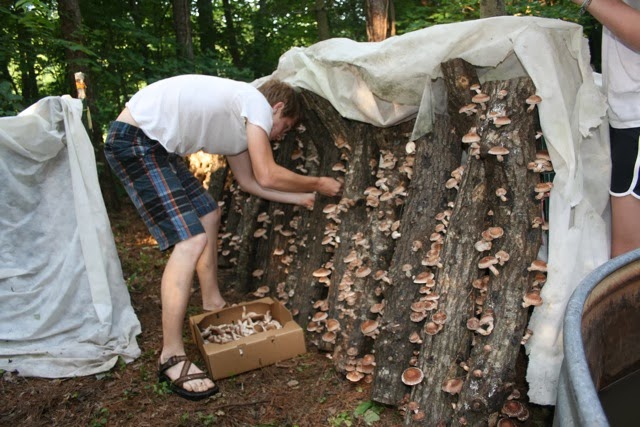by Mary Ellen
 |
| Polyculture work with Almond portobello and tomatoes. |
Earlier this month we attended the 15th Annual Michigan Small Farm Conference at the top of the mitten in Traverse City. The day-long event registered a record number of attendees, a thousand or more. It was impossible to miss the prevalence of young farmers in the mix. You can’t imagine how exciting it is for us “old timers” to see the small farm interest busting out with young, articulate, motivated people who are not only interested in land stewardship, but who are operating CSA’s and Market Gardens; already sharp farm managers. Lucky for cooks, mushrooms are part of the crop mix!
 |
| Mushroom grower at Ozark Forest efficiently picking Shiitake with the double handed harvesting method. |
The Keynote speaker, John Ikerd, Professor emeritus of Agricultural Economics at University of Missouri and a long time observer of farm sustainability, contributed some interesting observations and a convincing pitch for the viability of the small farm. He says, “Small farms of the future will be different from those of the past. They will utilize new knowledge, technologies, and market opportunities to become even better farms than before.”
Encouragingly, the emerging attitude amongst many of these young farmers is that it’s best to be driven by ethics, not economics. John Ikerd elaborated on this idea. “A real farm is not just an economic enterprise; it is also a way of life and a sacred trust. It’s not just about production and profits; it’s about meeting the real needs of real people, all people, both today and in the future. Real farmers care about their families, they care about the land, they care about their neighbors, they care about their customers, they care about society, and the future of humanity. A new renaissance and reversal of trends is emerging in the search for real food from real farms, and the real farms of the future will be appropriately small.”
The argument is not necessarily about the validity of “large farm” vs. “small farm.” The industrialization of agriculture over the last 50 years has played a large hand in cheaply feeding our growing world and providing us with food choices our grandparents could never have imagined. Though extremely difficult to evaluate, the real cost of degradation to our natural systems and subsequent biological and social effects on human society is increasingly influencing peoples’ food choices and subsequent growing support of the new small farm.
The way we see it, growing mushrooms is a way of adding value to a farming system that embraces the entire ecological cycle of harvest and decay. At Field and Forest Products, we are indeed “proud to be part of this rotting world,” and we are also very proud to be part of this exciting shift in agriculture and the people who are driving it.
For the transcript of John Ikerd’s keynote, go to:http://mismallfarmconf.files.wordpress.com/2014/02/john-ikerd-small-farms-are-real-farms.pdf

ReplyDeleteHello,
If you want to go into mushroom farming business, There are so many company website this days like http://www.virtatrade.com that will enable you as a beginner to raise the fund you need to start up your mushroom farming business without you seeking for a loan.
This company is where many business dealers from all over the world generate fund that backup their various businesses financially.
I used this company to backup my cocoa beans export business each time my business is running down.
You can visit and register with the company website here http://www.virtatrade.com to raise the fund you need now to go into your mushroom farming business.